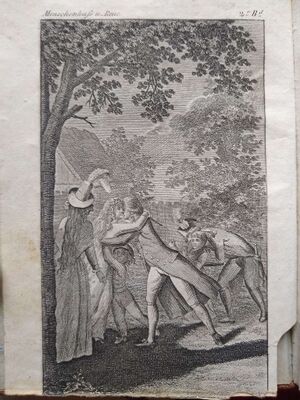August von Kotzebue: Difference between revisions
No edit summary |
add image to infobox |
||
| (9 intermediate revisions by 2 users not shown) | |||
| Line 1: | Line 1: | ||
August von Kotzebue (1761-1819) was a writer, dramatist, amateur theatre practitioner, editor, public intellectual and political actor. | {{Infobox person | ||
| name = August Friedrich Ferdinand von Kotzebue | |||
| image = Bildnis des August von Kotzebue (SM 6967z).png | |||
| birth_date = 3.5.1761 | |||
| death_date = 23.3.1819 | |||
| occupation = Dramatist, Writer | |||
}} | |||
[https://de.wikipedia.org/wiki/August_von_Kotzebue August von Kotzebue] (1761-1819) was a writer, dramatist, amateur theatre practitioner, editor, public intellectual and political actor. | |||
[[File:Menschenhaß und Reue 1827 Kopie.jpg|thumb|Menschenhaß und Reue, Illustration from August von Kotzebue’s sämmtliche dramatische Werke. Leipzig, bey Paul Gotthelf Kummer, 1827.]] | |||
== Kotzebue and amateur theatricals == | == Kotzebue and amateur theatricals == | ||
He is one of the first dramatists that became internationally known and his plays were translated to many languages already during his lifetime. He was particularly popular in amateur theatricals. With his "Almanach dramatischer Spiele" (1802 to 1820) he wrote and edited a series of easy pieces and one-act plays particularly suited for performance in amateur theatres. In 1784, together with Friedrich Gustav von Rosen, he founded the | [[File:Kanuti Gildi Saal1.JPG|thumb|Kanutigilde, Tallinn]] | ||
He is one of the first dramatists that became internationally known and his plays were translated to many languages already during his lifetime. He was particularly popular in amateur theatricals. With his "Almanach dramatischer Spiele" (1802 to 1820) he wrote and edited a series of easy pieces and one-act plays particularly suited for performance in amateur theatres. In 1784, together with Friedrich Gustav von Rosen, he founded the [[Liebhabertheater Reval|Liebhabertheater in Reval]] (today Tallinn, Estonia) and continued to write and perform for it until its closing in 1795. Here, he premiered most of his later famous pieces, e.g. "Menschenhaß und Reue" (premiered 1788), "Der Eremit auf Formentera" (1790), "Die Indianer in England" (premiered 1789), "Die Sonnenjungfrau" (premiered 1789). Kotzebue initiated the building of a stage in the Kanutigilde where they performed. The amateur theatre in Reval ended its activity after the opening of a professional theatre in the city. From 1812 to 1813 was Kotzebue the director of the Reval city theatre. | |||
[[Category:People]] | |||
Latest revision as of 21:14, 20 November 2024
Script error: The function "infoboxTemplate" does not exist. August von Kotzebue (1761-1819) was a writer, dramatist, amateur theatre practitioner, editor, public intellectual and political actor.

Kotzebue and amateur theatricals

He is one of the first dramatists that became internationally known and his plays were translated to many languages already during his lifetime. He was particularly popular in amateur theatricals. With his "Almanach dramatischer Spiele" (1802 to 1820) he wrote and edited a series of easy pieces and one-act plays particularly suited for performance in amateur theatres. In 1784, together with Friedrich Gustav von Rosen, he founded the Liebhabertheater in Reval (today Tallinn, Estonia) and continued to write and perform for it until its closing in 1795. Here, he premiered most of his later famous pieces, e.g. "Menschenhaß und Reue" (premiered 1788), "Der Eremit auf Formentera" (1790), "Die Indianer in England" (premiered 1789), "Die Sonnenjungfrau" (premiered 1789). Kotzebue initiated the building of a stage in the Kanutigilde where they performed. The amateur theatre in Reval ended its activity after the opening of a professional theatre in the city. From 1812 to 1813 was Kotzebue the director of the Reval city theatre.

